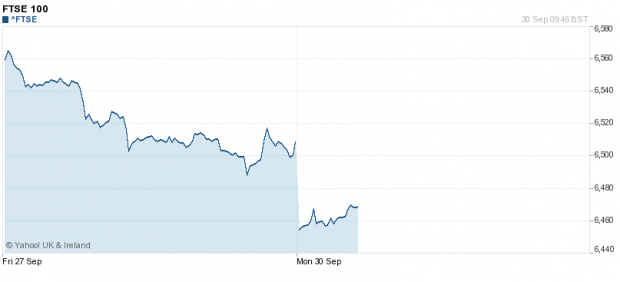Italian political turmoil hits markets and overshadows reports of upturn

Italian government bonds and shares have slumped this morning following Silvio Berlusconi's decision to take five ministers out of Enrico Letta's already fragile coalition at the weekend, and has left the Eurozone's third-largest economy without a functioning government.
Berlusconi, who may be ejected from the senate because of tax fraud, ordered the five ministers to quit after encouraging forecasts for the Italian economy. On Saturday, says Bank of America Merrill Lynch, the IMF:
released a financial stability assessment of the Italian banks highlighting some of the system’s weaknesses (amongst which was excessive weight of foundations in shareholding) and desirable steps, but in our view the overall findings were moderately reassuring.
But focus on banking activity has been, at least temporarily, overshadowed by political chaos as investors fear that fallout from the weekend may reach further than Italy. European Central Bank (ECB) measures have helped to safeguard the Italian economy, but this political upheaval comes as next year's budget law is under negotiations, making it somewhat untimely.
Nonetheless, President Giorgio Napolitano's determination to gain a new parliamentary majority, with Letta going before parliament on Wednesday and holding a confidence vote to confirm what is left of his parliamentary backing.
Alastair Winter, chief economist at Daniel Stewart & Co. comments on current Italian affairs and bonds market:
With echoes of the medieval struggles between popes and emperors, the Left now has the chance at last to destroy Mr Berlusconi but only at the probable cost of its own subsequent downfall. Prime Minister Letta seems more of a bystander as President Napolitano, the magistrates and the old Communist guard move in for the kill. Adherence to European Monetary Union (EMU) rules on austerity was already in doubt and structural reform is now less likely than ever. Sooner rather than later, Italian government bonds are likely to be downgraded to junk (yields are already rising) and a new EMU crisis will erupt.
On the effect on the FTSE, Alastair McCaig, market analyst for IG Market Commentary, says:
In mid-morning trading the FTSE 100 is down over 40 points… dragged lower by politics; not from the Conservative conference taking place but a combination of US and Italian political shenanigans. Italy has never been the most stable of countries when it comes to ruling parties and the latest turn of events instigated by the Silvio Berlusconi lead party is ensuring that this historical trend continues. Europe is already bracing itself for fresh turmoil following the German election results with the next Greek bailout looming, and the latest developments in Italy have arisen at a delicate time for European investor confidence.